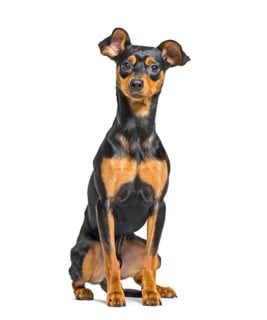
The Miniature Pinscher, also known as the Zwergpinscher, is a small, German breed that is believed to have been bred by crossing the German Pinscher and Italian Greyhound. It is thought to have been created sometime in the 1600s. They have a muscular, powerful frame and stand up to 12 inches tall. They are usually black, brown, or red but can have a variety of other color variations as well.They have a short, smooth coat and erect ears that have feathering in the upright position. Their signature feature is the blunt-shaped black nose and tiny, dark eyes that give them an almost cartoon-like look. This breed is known for its lively energy and independence and is a great watchdog. It has distinctive personality characteristics and is a loyal, courageous, and fastidious breed. It is also very intelligent and has been known to excel at competitive agility and obedience. The Miniature Pinscher is a special breed of its own and it differentiates itself from other breeds by its unique size, independence, and willingness to please its owners.
The Miniature Pinscher is an exceptionally intelligent breed and will require consistent training and exercise to keep him from becoming bored or from developing any bad behaviors. They are very friendly, gentle, and loyal towards their owners and can easily form strong bonds. However, due to their size and temperament, they can sometimes be standoffish towards strangers and other dogs. Despite this, they are more than capable of getting on with children and other pets if socialized from an early age. Miniature Pinschers have a lot of energy and require regular exercise every day to keep them healthy. While they do make a better fit for active households, they can be kept indoors given they have enough stimulation. They are also very alert dogs and can tend to be quite noisy if not properly trained. This breed is well-suited for activities such as daily walks and runs, playtime, and any other activity that can keep their minds and bodies active.
The Miniature Pinscher requires a diet that promotes growth and sustains energy levels in order to keep up with their active lifestyles. A diet rich in vitamins, minerals, and antioxidants should be supplemented with fatty acids from meat, fish, vegetables, and fruit. Adopting a Miniature Pinscher means committing to giving them a balanced, nutrient-rich diet. Owners should make sure to consult with a veterinarian to find out the right nutritional requirements and balanced diet for their own Miniature Pinscher.
For more information about the Miniature Pinscher diet and nutritional needs, check out Way Canina. There, owners can learn more about what to feed their pup, what to avoid, and how to ensure their Miniature Pinscher is living a long and healthy life. Taking the time to do research is a vital part of responsible dog ownership, and Way Canina is an excellent resource.
Regular veterinary check-ups, vaccinations, and preventive care are essential to maintain their optimal health and minimize risks of any hereditary conditions associated with this breed. Miniature Pinscher are also prone to dental disease so regular dental care is recommended. Grooming needs such as brushing, bathing, and ear cleaning should be done regularly. A balanced diet with portion control and regular exercise will help the Miniature Pinscher stay healthy and avoid obesity. With proper care, the Miniature Pinscher can live a long, happy life.
The Miniature Pinscher is a small breed of dog that is active and full of life. They have a lifespan of around 13-14 years, though can live longer when given the right care.
In addition to a balanced diet, responsible Miniature Pinscher owners should pay close attention to portion size. If the Miniature Pinscher becomes overweight, they may be at risk for conditions such as arthritis, spinal problems, and heart problems. Too little food can also be detrimental, possibly leading to fatigue and malnutrition.
Are you thinking about getting a Miniature Pinscher? Before you make a final decision, it’s important to consider the responsibilities of owning this breed. Not only are Miniature Pinschers energetic and require a lot of attention, but they also tend to bark quite a bit. Make sure you read up on the pros and cons to determine if this is the right breed for you. Check out Way Canina for our blog posts and articles on different dog breeds to find additional information on their lifestyles and wellbeing.